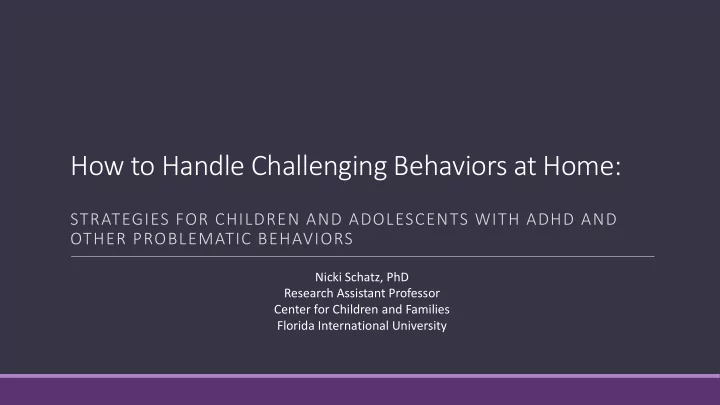

How to Handle Challenging Behaviors at Home: STRATEGIES FOR CHILDREN AND ADOLESCENTS WITH ADHD AND OTHER PROBLEMATIC BEHAVIORS Nicki Schatz, PhD Research Assistant Professor Center for Children and Families Florida International University
Center for Children and Families at FIU Established at SUNY, Buffalo by Dr. William Pelham in 1996 Moved to FIU in 2010 More than 40 affiliated faculty in 2014-2015 Collaborations across departments: College of Medicine, College of Arts and Sciences, College of Public Health and Social Work, and College of Education Top Researchers in Child and Adolescent typical development and mental health problems
Center for Children and Families at FIU Advance evidence based knowledge of causes, mechanisms, outcomes, and interventions for mental health in youth Promote development of effective treatments and prevention Provide state of the art intervention to children Share findings with and train students and community professionals effectivechildtherapy.org ccf.fiu.edu
What causes challenging behaviors? What can parents do about challenging behaviors at home? What about during homework time? How can parents work with teachers to address challenging behaviors at school? What types of programs are available for families at the Center for Children and Families?
Challenging Behaviors
Types of Challenging Behaviors Arguing – Talking Back Breaking Rules Not doing what parents/teachers/other adults ask Fighting with siblings Forgetfulness Taking too long to finish things Homework difficulties Impulsivity Hyperactivity
Coercive Cycle Intensify Request Compliance Withdraw Noncompliance Request
Attention-Deficit/Hyperactivity Disorder Core Features ◦ Inattention ◦ Hyperactivity ◦ Impulsivity Subtypes Childhood Onset Cross-situational Impairment
ADHD and Impairment Children Adolescents and Young Adults ◦ Academic ◦ Driving ◦ Social ◦ Workplace ◦ Home ◦ Risky Behaviors ◦ Comorbid Conditions ◦ Romantic Relationships Adults ◦ Parenting ◦ Marriage
ADHD: Evidence-Based Treatments Behavioral Treatment Stimulant Medication
What influences children’s behaviors? Community School Family Child
Child Characteristics Parent Characteristics Child Behavior Family Stress Parenting Style
ABCs of Shaping Behaviors A B C Anticipating Consequences Behaviors
Let sleeping dogs lie. Catch kids being good Most of the things adults say to children and teens are questions or commands Benefits of positive feedback Increases compliance Improves parent-child relationship Parents get better at noticing children’s strengths Types of positive feedback Good job! Hugs Smiles High fives 3 to 1
Ignoring Minor Misbehavior Can be a powerful tool to reduce frequency of misbehaviors Good for minor irritating/annoying behaviors Fidgeting, Whining, Begging, etc. Reduces negative parent/child interactions Extinction burst Praise appropriate behavior as soon as possible
Giving good commands Short Specific Get their attention Positive not negative Watch out for “Let’s” Phrased as a command, not as a question Large tasks broken into smaller pieces Follow-up with appropriate consequence for compliance or noncompliance
When-Then When you [ INSERT THING CHILD NEEDS TO DO], then you may [INSERT THING CHILD WANTS TO DO].
Time-Outs and Grounding Time out from reinforcement Children vs. Adolescents Time-out Tips Location - away from reinforcement Explain why Duration – approximately 1 minute per year of age Ending time out Grounding Must be enforceable Must make an impact Back up consequences Explain to kids ahead of time
Homework Time
Set kids up for homework success Establish a routine: ◦ Where – avoid noisy, busy, distracting places ◦ When Catch them being good Planned ignoring Plan for breaks Break large assignments into manageable pieces Use when/then
Challenging Behaviors at School
Benefits of a Daily Report Card Many studies have shown that DRCs are effective in changing children’s behavior at school DRCs cost very little and take little teacher time Provide daily parent/teacher communication Reduce need for notes and phone calls home to parents Once established, they reduce the amount of time teachers spend dealing with problematic behaviors Provide a tool for monitoring child’s progress Detailed description of how to set up a DRC at ccf.fiu.edu
DRCs work for a wide range of behaviors Academic Productivity – “Completes at least 80% of math assignments within the specified time.” Following Classroom Rules – “Interrupts class less than 2 times per period.” Peer Relationships – “Keeps hands to self with fewer than 2 reminders per period.” Teacher Relationship – “Maintains appropriate eye contact when speaking with teacher with fewer than 3 reminders. Time Out Behavior – “Serves time outs appropriately (i.e., follows posted time out rules).” Responsibility for Belongings – “Has materials necessary for class.” Homework – “Writes homework in assignment book with no more than 1 reminder.”
Programs for Youth at the CCF
ATLAS Program Adolescents (ages 12 – 16) with ADHD All teens receive 5 free counseling sessions aimed at reducing impairment Some teens and their parents may receive additional sessions, if needed Part of a study looking at strategies to reduce problems with alcohol and other drugs If interested, please call: 305-348-3891
Adherence Program Purpose : Teach teens with ADHD about medications for ADHD and how the medication may be helpful for them. Adolescents (ages 12-16) with ADHD Taking medicine for ADHD currently or in the past Families learn to track teen compliance with medication Some families receive counseling sessions to learn about medication and problem-solve medication use If interested, please call: 305-348-8166
THANK YOU! Center for Children and Families Florida International University 11200 SW 8 th St. AHC-1 RM 341 Miami, FL 33199 Phone: 305-348-0477 Web: ccf.fiu.edu
Recommend
More recommend